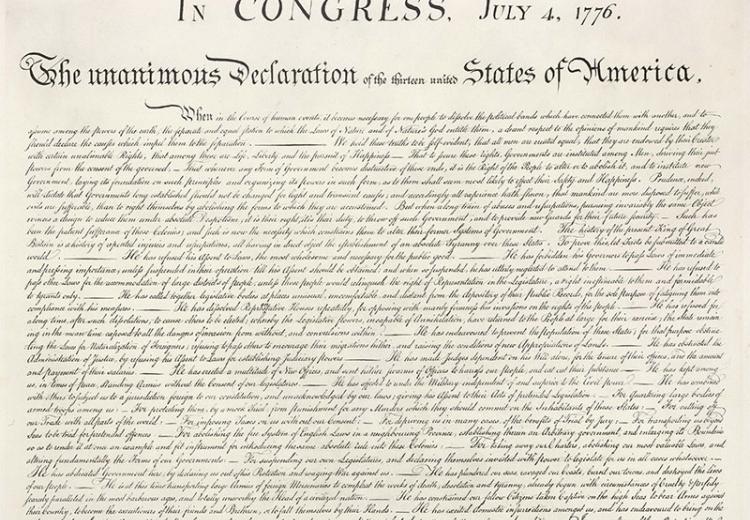The Declaration of Independence: "An Expression of the American Mind"

United States Declaration of Independence.
"This was the object of the Declaration of Independence. Not to find out new principles, or new arguments, never before thought of, not merely to say things which had never been said before, but to place before mankind the common sense of the subject, in terms so plain and firm as to command their assent, and to justify ourselves in the independent stand we are compelled to take. Neither aiming at originality of principle or sentiment, not yet copied from any particular and previous writing, it was intended to be an expression of the American mind, and to give to that expression the proper tone and spirit called for by the occasion. All it's [sic] authority rests on the harmonizing sentiments of the day, whether expressed in conversation, letters, printed essays, or in the elementary books of public right, as Aristotle, Cicero, Locke, Sidney, & c."
—Thomas Jefferson to Henry Lee, May 8, 1825
In an 1825 letter to Richard Henry Lee, Thomas Jefferson, the principal author of the Declaration of Independence, discussed who deserved credit for the ideas contained in that document. Looking back to the early years of the American Revolution, Jefferson related how the decision "to resort to arms for redress" of American grievances led patriots of the American cause to issue "an appeal to the tribunal of the world" with an eye towards explaining and justifying the American actions.
Reflecting back forty-nine years after the fact, did Jefferson accurately portray the process that went into the creation of the Declaration of Independence? If so, what were those "harmonizing sentiments of the day" to which he referred? This lesson plan looks at the major ideas in the Declaration of Independence, their origins, the Americans' key grievances against the King and Parliament, their assertion of sovereignty, and the Declaration's process of revision. Upon completion of the lesson, students will be familiar with the document's origins, and the influences that produced Jefferson's "expression of the American mind."
Guiding Questions
What are the major ideas expressed in the Declaration of Independence?
What are some of the sources for the language and ideas found in the Declaration of Independence?
Learning Objectives
Analyze the Declaration of Independence to understand its structure, purpose, and tone.
Compare the language and philosophies presented in the Declaration of Independence with the likely source materials used by the writers.
Evaluate the interconnected nature of the key ideas in the Preamble to the Declaration of Independence: natural rights, the social contract, the right to revolution, popular sovereignty, and the right of self-determination.
Analyze the items and arguments included within the document and assess their merits in relation to the stated goals.
